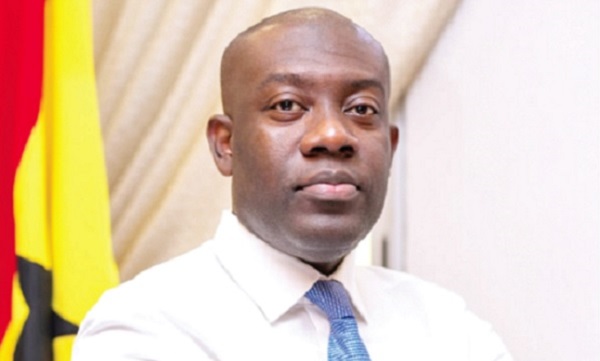
Use radio platforms to foster unity - Oppong Nkrumah charges stakeholders
The Minister of Information, Kojo Oppong Nkrumah, has called on stakeholders within the radio industry to use their platforms to help bring peace and unity particularly to areas prone to conflicts.
In a speech to commemorate World Radio Day yesterday, he said radio had proved to be a valuable tool in conflict prevention and nation building, hence stakeholders must rely on it to bring people together and foster a sense of community.
While celebrating the broadcasting industry for its work over the years, the minister also drew the attention of media houses that operated particularly in areas where sometimes conflicts might arise to the need to place emphasis on peace.
“ In Bawku and other places, I'm sure you are familiar with the stories of how media houses or radio sometimes have contributed to the conflict instead of helping to bring about peace in those places, “ he said.
He added: “On a day like this, we would like to remind our colleagues who operate in places where sometimes tensions may rise, that we have a particular responsibility to help in the exercise to bring peace and unity and not necessarily fuel it.”
Celebration
World Radio Day was declared by the United Nations General Assembly in 2011 and has since become a global celebration, with events and activities taking place in over 100 countries.
The day is meant to, among other objectives, extol the importance of radio, promote international cooperation among radio broadcasters and urge decision-makers and duty-bearers to create and provide access to information through radio.
This year’s celebration was on the theme: “Radio and Peace”.
UNESCO sought to use the occasion to highlight the importance of independent radio as a pillar for conflict prevention and peace-building
Reach
The minister emphasised that radio had a unique ability of reaching diverse people across different cultures and when relied upon, could be used to promote dialogue, promote understanding and unity, as well as provide a platform for diverse voices to be heard.
Mr Nkrumah also encouraged the public to rely on radio as a major source of information while also contributing their quota towards a more peaceful and unified society.
In a related development, the Ghana Journalists Association (GJA) has called on the National Media Commission (NMC), as the regulatory body, and institutions of authority such as the National Communications Authority (NCA), to collaborate to call erring radio broadcasters and stations to order.
“We expect the NMC in particular to be proactive in its monitoring function and sanction radio stations that violate professional and ethical principles,” the association stated in a statement issued today ( Monday) to commemorate World Radio Day.
Signed by the General Secretary of the GJA, Kofi Yeboah, the statement said the GJA believed that one critical step needed to be taken to sanitise the airwaves was the passage of the Broadcasting Bill which had been going in and out of Parliament for many years.
“We urge the Executive and Legislature to give maximum attention to the bill and get it passed immediately.
In fact, the Executive and Parliament cannot absolve themselves of blame as far as the current state of radio broadcasting in Ghana is concerned, and until they work in concert to pass the Broadcasting Bill immediately, they cannot raise any clean hands against the ills of radio broadcasting in Ghana,” the GJA stated.
Refine programmes
The association expressed deep concern about the many instances radio programmes or broadcasts tended to foment violence to a very large extent rather than promote peace.
Consequently, the GJA called on the owners and managers of such radio stations to refine their programmes and ensure sanity on their airwaves.
“It is disheartening to note that sometimes the owners and managers of radio stations who are expected to guide radio broadcasters on the path of professional righteousness are themselves the masterminds and promoters of unprofessional conduct that tend to undermine peace,” it stated.
Obligation
The GJA also encouraged radio broadcasters to be conscious of their obligation towards peace, especially as the 2024 electioneering gathered momentum.
“The high stakes at the intra-party and inter-party levels of politics, as well as the high-voltage anxiety, tension and frustration emanating from the country’s current economic challenges, provide good seeds of disorder, chaos and violence.
“But under no circumstance must radio provide the fertile ground for the sowing and germination of such destructive seeds.
Rather, radio owners, managers and broadcasters must use their platforms for peace-building and conflict prevention,” the association urged.
Powerful tool
The association indicated that radio was a powerful communication channel that could be used for good and evil in equal measure.
“In the case of the latter, the broadcast of hate propaganda by Radio Television Libre des Mille Collines in Rwanda, which fuelled the infamous genocide that occurred in that country in 1994, leading to the death of about 800,000 people, is still fresh in memory.
“However, and in the case of the former, one of the cardinal purposes of radio, which UNESCO seeks to highlight in the commemoration of this year’s World Radio Day, is to prevent conflict and promote peace,” the statement stated.
Congratulations
The GJA congratulated all radio broadcasters who had been faithful to professional and ethical practice, and worked diligently to promote the cause of peace and national development.
